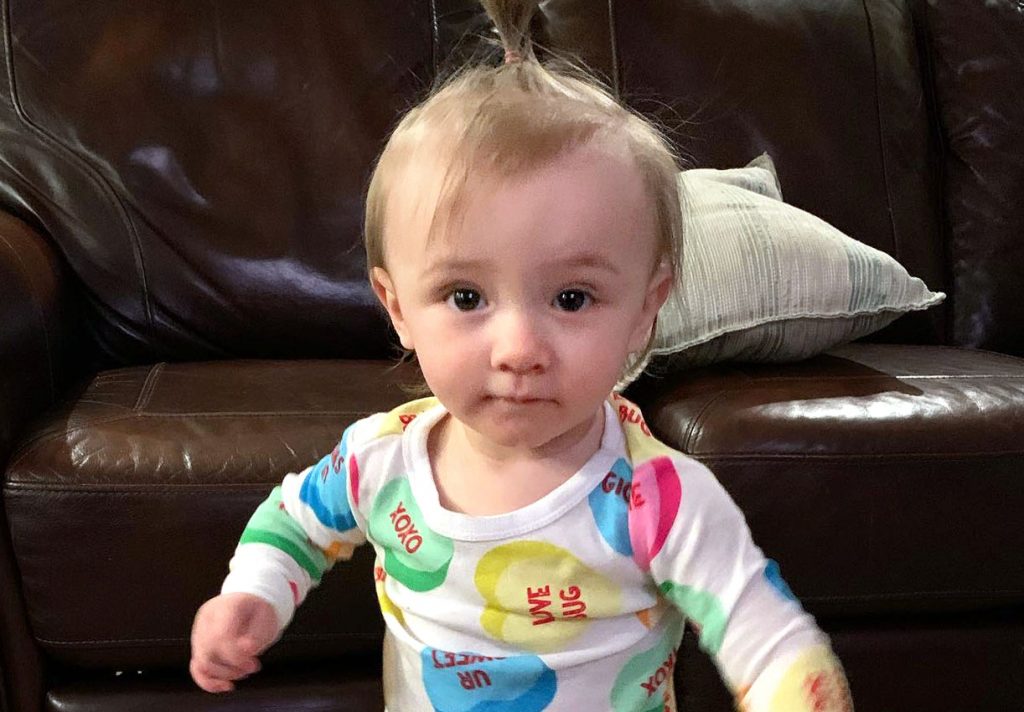SAN JOSE — The South Bay’s first-ever murder case over the fentanyl overdose death of a baby is being tested in a key hearing that will decide whether the unprecedented charges will proceed to trial.
This week, the preliminary examination began in a San Jose courtroom for three defendants in the Aug. 12 death of Winter Rayo, who was a year and a half old when police and emergency personnel were called to her San Jose home and found the body of the toddler, who had been dead for several hours.
Kelly Gene Richardson, left, and Derek Rayo, mother and father of 1-year-old Winter Rayo, who died of a fentanyl overdose in August, appear for their arraignment on Monday, Nov. 27, 2023, at Santa Clara Hall of Justice in San Jose, Calif. (Dai Sugano/Bay Area News Group)
Her parents, 27-year-old Derek Vaughn Rayo and 29-year-old Kelly Gene Richardson, were charged with murder last fall on the premise that their prolific drug use around the child exceeded criminal negligence, which parents in previous baby fentanyl deaths in the county faced. Authorities said that powerful illegal opioids and other drugs were scattered throughout the house and within Winter’s reach.
Then, in another surprise development, the Santa Clara County District Attorney’s Office in April filed murder charges against a couple living at the same home, Phillip Ortega and Paige Vitale, on allegations they supplied illegal narcotics to Rayo and Richardson, and contributed to the dangerous environment in which the baby eventually ingested a massive dose of fentanyl and methamphetamine.
Richardson is not part of the preliminary examination. Her attorney declared a doubt of her competence to participate in her defense; over the objection of prosecutors, a judge suspended her case pending the results of a court-ordered psychological evaluation.
On Thursday, the second day of testimony in front of Superior Court Judge Deborah Ryan, Assistant Medical Examiner-Coroner Susan Parson detailed what is perhaps the most shocking fact to come from the tragedy: Winter’s bloodstream had a fentanyl content of 74 nanograms per milliliter.
Paige Vitale, left, makes a court appearance at the Hall of Justice on Wednesday, April 17, 2024, in San Jose, Calif. Vitale is facing charges related to the death of Baby Winter, 18 months old, who died of fentanyl poisoning last year. (Aric Crabb/Bay Area News Group)
Parson cited an estimate that 3 nanograms per milliliter would be deadly for a baby of Winter’s age and weight, meaning that Winter’s blood had nearly 25 times the lethal amount. She also noted that Winter’s bloodstream also contained 15 nanograms per milliliter of the fentanyl metabolite 4-ANPP, which appears to have helped form the basis of the criminal charges.
The latter’s presence, Parson said, “indicates an illicit source, not a drug prescribed by a doctor.”
Winter’s bloodstream also contained 30 nanograms per milliliter of methamphetamine, rounding out the three-part official cause of death listed for the child: Combined fentanyl, 4-ANPP and methamphetamine toxicity.
In other testimony from the hearing’s first day on Wednesday, Sgt. Ivan Barragan recounted police interviews with Rayo and Richardson in which they described Winter being itchy the day before she died, and Rayo voicing remorse that he had accidentally rolled on top of the baby in bed that morning.
The rollover anecdote was probed by the defense attorneys, but Parson was firm in saying that the incident had no impact on what killed Winter.
Defense attorneys also questioned the estimate for exactly when Winter died, since part of the allegations underpinning the murder charges against the parents were that they waited several hours before calling 911 after discovering that the child was not breathing. Prosecutors contend that Winter was dead for at least 12 hours before first responders got to her.
When they did, Winter was covered with a rug, and they reportedly told investigators that they wanted to grieve her death before they would be inevitably separated from her by authorities.
Related Articles
Video: 20-person smash-and-grab robbery at Sunnyvale jewelry store
Suspect in an arson blaze that damaged a South Bay McDonald’s is arrested
Palestinian supporters claim responsibility for small fire set on UC Berkeley campus
77-year-old Oakland homeowner released from jail without being charged in shooting death of suspected burglar
COVID-19 fraud scheme lands Bay Area restaurateur behind bars
Renee Hessling, who is representing Ortega, questioned Barragan in what appeared to be an effort to establish that her client did not carry out any parental roles or responsibilities for Winter, and thus could not be culpable for her murder, as prosecutors have asserted.
Phillip Ortega makes a court appearance at the Hall of Justice on Wednesday, April 17, 2024, in San Jose, Calif. Ortega is facing charges related to the death of Baby Winter, 18 months old, who died of fentanyl poisoning last year. (Aric Crabb/Bay Area News Group)
There was also sparring between the defense attorneys and Parson over a late-stage addition to the autopsy report to comply with a law-enforcement request to send Winter’s stomach contents for testing. The results of the additional testing prompted the coroner’s office to update the autopsy report, and the attorneys drew focus to how the office asked recipients of the initial report to destroy the document.
Parson characterized the revision as a procedural move meant to avoid tacking on an addendum to the just-finalized document. The results of the gastric testing confirmed that white granules found in Winter’s stomach were more ingested narcotics, but Parson said this had no bearing on the child’s death because they had not made their way to her bloodstream.
The preliminary examination is scheduled to continue Monday and Thursday, and could continue into the following week. At its conclusion, Judge Ryan will decide on whether there is sufficient evidence to allow the murder charges to head to trial.


